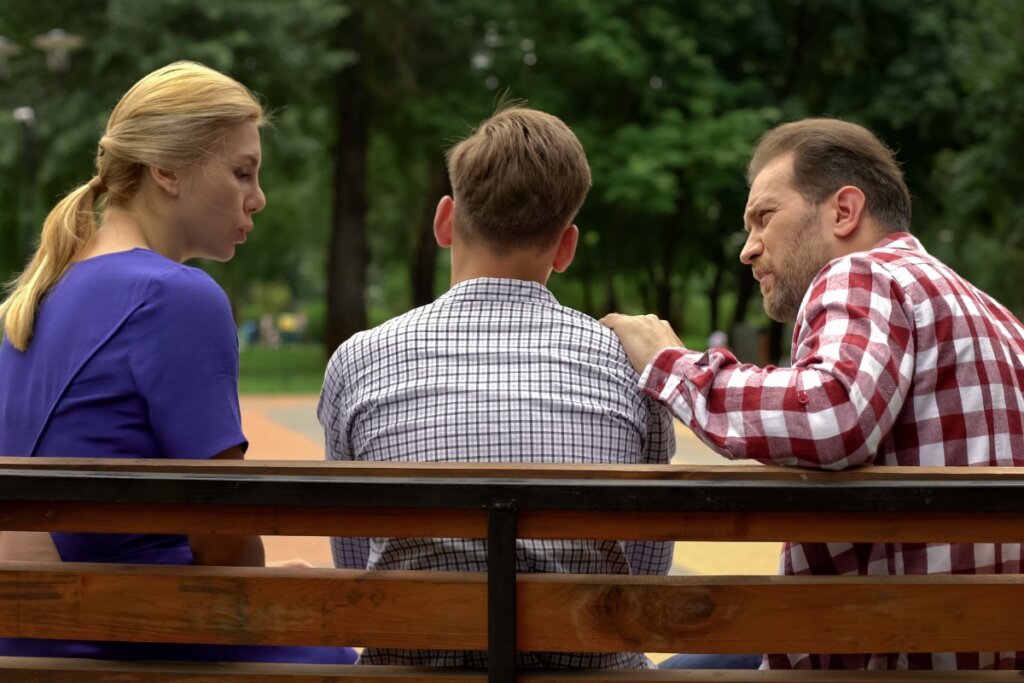Families Can Make Psychotherapy Fail


Written and verified by the psychologist Elena Sanz
When people experience suffering on psychological or emotional levels, their families might react in really different ways. Of course, some of them support and encourage their relative’s recovery. However, there are also those that, in a more or less subtle or manifest way, hinder and obstruct the process. In fact, families can make psychotherapy fail.
It may not be easy for the patient to realize that they’re being sabotaged by those closest to them. Or perhaps, even if they do perceive it, their influence is so great that they end up choosing to abandon the therapy in favor of family harmony. This phenomenon is extremely common, so it’s useful to know how to manage it properly.
How families can make psychotherapy fail
It’s estimated that one in eight people in the world suffers from a psychological disorder. This means that many families find themselves in the position of having to support a loved one in the recovery process.
The family’s role is really important. Indeed, it’s been demonstrated that the emotional and instrumental support provided by family members and other close people helps the patient feel more capable of coping with their situation and moving forward.
However, this support isn’t always available. As a matter of fact, on many occasions, it’s just the opposite. In these cases, there’s an attitude of resistance and rejection of the therapy and the changes that derive from it. In reality, it’s not a matter of relatives being mean and not wanting what’s best for the patient. It’s the fact that all family systems maintain a certain balance and even though these systems may be dysfunctional, members try not to break them.
Thus, in most cases, these attitudes of rejection respond to unconscious reasons. But, this doesn’t mean we should ignore them. In fact, they can really impede a patient’s recovery. Below, we explore the main reasons that families can make psychotherapy fail.

Underestimating the value of therapy
We’ve come a long way in terms of raising awareness about the importance of mental health. That said, there are still those who think that going to therapy is useless. It may be that they consider that the patient’s problem isn’t that serious. Or, they believe that therapy isn’t effective.
Moreover, some people believe that they shouldn’t wash their dirty laundry in public. Or, they think that a mental disorder is simply caused by a lack of will on the part of the patient. These ideas are often deeply rooted. In effect, they consider the idea of telling all to a third person, however expert they may be, as a complete waste of time and money.
They’re alluded to at some point
It occasionally happens that, in the beginning, the family appears to support the treatment but later stops doing so. This might be because they’re spoken about in the therapy sessions.
From a systemic perspective, the patient is considered to be the carrier of the symptom. However, in reality, there’s a dysfunctional dynamic that affects the entire family system. Thus, the patient is no longer considered to be the one with the problem. In fact, the gaze is broadened to include the entire family nucleus, its interactions, its communication, and its functioning.
This can cause some relatives to react with rejection, feel attacked, and refuse to assume their share of responsibility for the origin of the situation and for any possible solution. Somehow, when it’s their relative who has to ‘fix themselves’, they show support but, when their own role is referenced, they shut down completely.
Losing privileges
On the other hand, family members might withdraw support when they feel they’re in danger of losing certain privileges. For example, maybe the patient was a really accommodating person, who was dependent on and dedicated to their family. But, in the therapy process, they learn how to set boundaries, how to prioritize themselves, and how to identify psychological manipulations and react to them.
Consequently, they may decide to spend less time with their family, refuse to accept the kind of abuse that they previously tolerated, and begin to speak up for themselves. Of course, this makes those who previously benefited from the previous situation feel uncomfortable. Thus, in order to recover their previous status, they might refuse to accept the patient’s improvement. Moreover, they may tell them that they’re changing for the worse and that the therapy is doing them no good at all.

Psychotherapy threatens the family balance
As we mentioned earlier, families seek to maintain the established balance. Therefore they don’t accept changes well. That’s because change tends to threaten the previous dynamics and operations, which have been maintained for years. In fact, when a member of the system begins to change, it’s really common for the rest of the family to experience feelings of discomfort and rejection. Moreover, they may attempt to recover their previous status.
The ways in which families make psychotherapy fail are extremely diverse. For example, in the case of children and adolescents, parents may refuse to continue taking them to sessions or withdraw financial support. In these situations, their influence is total and the process ends just when the changes were beginning.
Sabotaging the patient
Even for adults, the sabotage can be intense. For instance, family members might start pointing fingers at the patient, reproaching them for their changes and new attitudes, get angry, and withdraw their affection or emotional support. Thus, an individual who was happy with their psychotherapeutic process, fulfilling their tasks, and making great progress, may start to resist, stop cooperating, or even abandon the therapy completely.
For this reason, it’s important to consider that rejection by the family is extremely common and that it can greatly affect the patient. By being aware of this fact, the patient will be able to remain firm and continue therapy, despite any obstacles and reproaches that other family members may make.
Let’s bear in mind that the family system always seeks to maintain balance. However, this isn’t necessarily healthy. In fact, by changing things, the patient won’t only be helping themselves but everyone around them as well.
All cited sources were thoroughly reviewed by our team to ensure their quality, reliability, currency, and validity. The bibliography of this article was considered reliable and of academic or scientific accuracy.
- Acevedo Sierra, L., & Vidal López, E. H. (2019). La familia, la comunicación humana y el enfoque sistémico en su relación con la esquizofrenia. Medisan, 23(01), 131-145.
- Fernández Peña, R. (2005). Redes sociales, apoyo social y salud. Perifèria: revista de recerca i formació en antropologia, (3).
- Organización Mundial de la Salud. (2022). Trastornos mentales: datos y cifras. https://www.who.int/es/news-room/fact-sheets/detail/mental-disorders#:~:text=En%202019%2C%20una%20de%20cada,personas)%20padec%C3%ADan%20un%20trastorno%20mental.
This text is provided for informational purposes only and does not replace consultation with a professional. If in doubt, consult your specialist.








